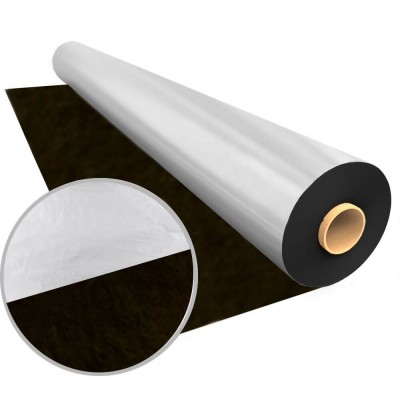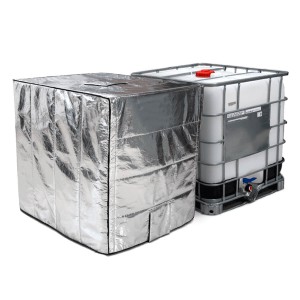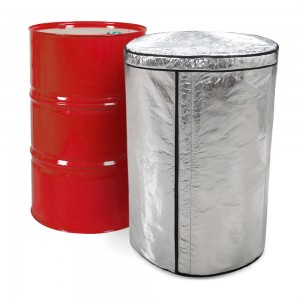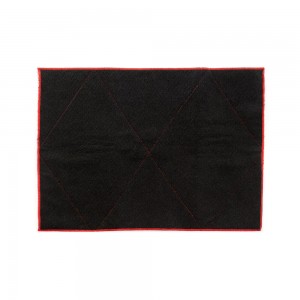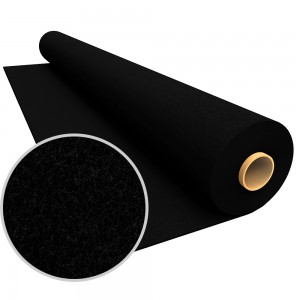NON-WOVEN ALUMINIZED NT PREOX 500AL
THERMAL SHIELD AGAINST CONVECTIVE AND RADIANT HEAT
NT PREOX 500AL flame retardant fabric is composed by a pre-carbonized fiber non-woven fabric, and a polyacrylonitrile (PPAN) fabric aluminized with a layer of 12 microns of 100% aluminum. Pre-carbonized PPAN fibers, also known as Preox, have a good performance when being contacted directly to flames, with a LOI index close to 40 points in some cases, and they are considered as a good thermal insulator. The aluminized side works as a thermal shield, blocking temperature transference and enhancing thermal insulation in front of convective heat sources, radiant heat, or direct flame. This aluminized non-woven fabric NT PREOX 500AL has a thickness of 3,5 mm, a weight of a little more than 500 g/m2 and great flexibility and adaptability to any object or area, turning this fabric into a good option to tailor fire resistant covers with thermal insulation.
The aluminized side of NT PREOX 500AL fabric confers to it resistance to flames and protection before radiant convective heat sources. In addition, pre-carbonized fibers from the internal side perform as a thermal insulator, turning the set into an excellent thermal shield and thermal barrier. It's insulation features turn it into an excellent solution to protect objects, surfaces or areas. NT PREOX 500AL fabric behaves exceptionally good in welding works, where it comes in contact with the blowtorch's flames used in plumbing works.
NT PREOX 500AL can withstand temperatures up to 300ºC in continuous work being able to arrive up to 700ºC in working peaks. It can be placed in all directions and positions, but it's recommended to use it with the PREOX side (black face) when there is direct contact with fire or flames, and with the aluminum side when is aimed to protect from radiant or convective heat, in the case of using it as a thermal shield.
NT PREOX 500AL has been tested in internal laboratories according to regulation UNE-EN ISO 6942:2002 -Protection against heat and fire, using the test method: Evaluation of materials and sets of Materials, when exposed to a radiant heat source-, obtaining a C3 result. And according to regulation UNE-EN ISO 9151:2018 - Protection clothes against heat and flames. Determination of heat transferring when exposed to a flame, with a B1 result.
FEATURES
- Weight 550 g/m2 useful width 150 cm and thickness 3,5 mm.
- Flexible fabric, easy to handle, it does not fray when being cut with scissors, but some fibers can be left.
- Suitable for indoor and outdoor use.
- Totally opaque, suitable to protect sensible elements.
- Its fire resistant features do not decrease with use. It does not expire.
Data sheet
- Convective heat
- ISO 9151 | B1
- Radiant heat
- ISO 6942 | C4
- Smoke class
- NF F 16-101 | F2 CLASS
- Fire reaction
- NF P 92 503 | M1 CLASS
- Flame propagation
- ISO 15025 | A1 - A2
- Heat resistance
- ISO 17493 | 180 ºC : APPROVED
- Combustion spread
- ISO 3795 | 0
APPLICATIONS.
- Plumbing blowtorch welding blanket.
- Protector of torch welding.
- Flame retardant insulation covering.
- Heat engine insulator.
- Insulator for tubes and ducts.
- Thermal barrier.
- Thermal shield.
- Covers against fires.
- Radiant heat protector.
- Thermal insulator.
- Cases for drums or pallets.
SECTORS.
- Torch welding plumbing sector.
- Construction sector.
- Foundries and metal industries.
- Installer and maintenance companies.
- Logistics, transport and storage industries.
- Fire protection of valuable objects.
- Fire protection of risk or flammable products.
USE RECOMMENDATIONS.
- Use it by the black colored side (PREOX fibers) for a direct flame exposure.
- Use it by the aluminized side when the heat source is located at some distance and there is no contact with flames.
- Never use alcohol, solvents or detergents to wash it, flammable rests can remain.
- Do not rub, brush nor vacuum on the black colored side.
- The aluminized side can be washed with a wet cloth.
- The higher the distance from the flame and heat's source, the better the fabric will behave.
- Check its status before its use.
